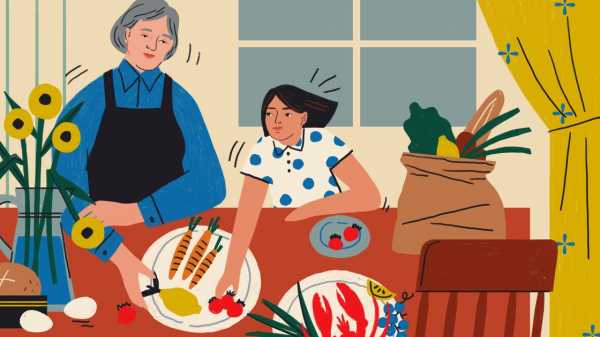
When I was five years old, my father, a basement-reared son of inner London, decided to take his young family to rural Ireland for the summer. He’d booked rooms in a heavily recommended bed-and-breakfast, which was reportedly awash with adorable animals and good old-fashioned cooking. But, as we drove up to the silent entrance and spotted the light-up holy scene above the door, my parents began to wonder if a family of expressive urban atheist Jews was going to fit in. There were no animals; the hosts were surly; the mashed potato was instant. We lasted a day and then, feigning an emergency back home, we paid up and fled.
Now what? Hungry children, not much money, and a fortnight of Irish rain ahead might have broken most couples. Yet, for some reason, my parents went free-range. Nearby was a different farmhouse, Ballymaloe, which was highlighted in my gourmand father’s “Good Food Guide”; he and my mother decided to splurge. And so began our first encounter with a place that provided some of my best childhood memories, and with Myrtle Allen, its founder, whose approach to food has informed many of my deepest adult pleasures.
Allen, who died last month, at the age of ninety-four, was born a Quaker in County Cork, in the south of Ireland. She married a farmer, had many children, started making unpretentious dinners for guests in the farmhouse, and gradually became one of the world’s foremost cooks, hoteliers, and pioneers of slow food. But when the Mendelson family rocketed up that day in the seventies, Ballymaloe House was not yet widely known, despite having been recently awarded a Michelin star. Good restaurants served French food; the idea that Irish family recipes, good meat, garden vegetables, and fish from local fishermen could attract visitors, let alone be magnificent, was deeply weird. We didn’t care. We ate and ate, and, the next year, we returned.
But not only because of the food. Yes, those extraordinary breakfasts, of bacon and orange-yolked eggs and brown bread and smoked fish, the ambrosial loganberry jam, the butter weeping with freshness, still torment me, like a dream whose fleecy shreds one cannot reassemble. The buffet lunches, the steaming floury potatoes and unlimited roast ham and apple compote flavoured with rose-geranium leaves, set a standard of good eating to which I still aspire. But, had the Allens been more like the average English hoteliers of that period—televisions crackling in cigarette-bathed rooms, towels twenty pence extra—no amount of fresh seafood could have tempted us back. This was barely a decade after my father, seeking lodgings in Oxford, faced “No Blacks No Irish No Jews” signs; we expected inhospitality. What we had accidentally discovered was its opposite: a welcoming family-holiday idyll with, best of all, none of the stresses of one’s own family life.
That summer, and every summer for the next decade, we revelled in “our” rooms, went to “our” beaches, and generally acted like we owned the place. Everyone did. The sofas were a little worn and the staff amusingly cheeky; we borrowed rusty bikes and rode unsuitably enormous horses, played in hay barns, searched for still-warm feather-spotted eggs. Sometimes, if we returned from these adventures cold and wet, Myrtle would give us soup on a kitchen stool. Usually, she cooked us tea-time meals with her grandchildren: fresh lemonade, porky sausages, and deep-fried sugar-dredged donuts she called “balloons.” She was the unscary center of it all: neither glamorously starry nor predictably homely, just a cheekbone-y, floral-bloused force of steadiness and calm. We brought her colossal, Plath-worthy blackberries, and “helped” with the vegetables; she remained a benign deity, of whom even I could not be shy.
Under her benevolent control, this outrageously warm household became increasingly famous. The hotel grew; Allen was wildly and widely praised, the Irish Alice Waters. Happily, I didn’t notice. Instead, I accumulated memories: the taste of carrageen pudding; the smell of woodsmoke; the day I fell in the nettles at Ballycotton and had an ankle-sock of stings, or cut my toe on the rocks at Ballyandreen, or helped my sister train the world’s least interested farm dog with croquet balls. I felt loved there; I was myself.
I didn’t properly consider the source of my adult obsession with growing and eating food until I started writing a gardening memoir, several years ago. Then I couldn’t stop remembering Ballymaloe. Now I bake Myrtle’s brown bread weekly; my salads are mainly herbs; I believe in the power of carrageen and read her cookery book in the bath. And, each summer, I long to go back. When we did briefly return, five years ago, for my father’s seventieth birthday, Myrtle remembered us all. She showed me how to make soda bread, and I told her a little of my life. The smell of roast lamb and rosemary and flowers that hit me when I pushed open the fire door to “our” old rooms was more than Proustian; it was a return to paradise. Myrtle made my childhood happier, and in her recipes her warmth and memory live on. Lucky us.
Sourse: newyorker.com






